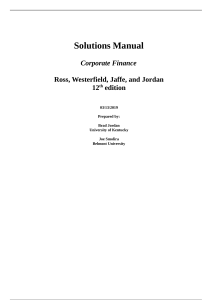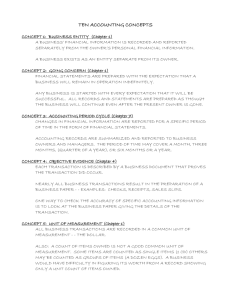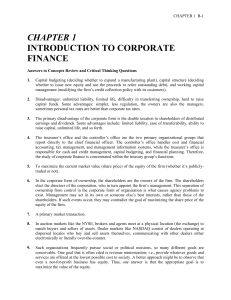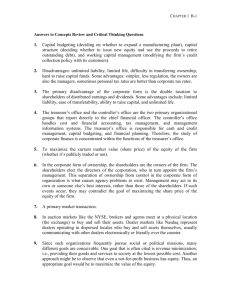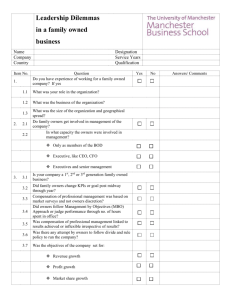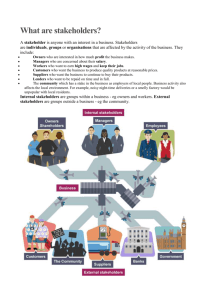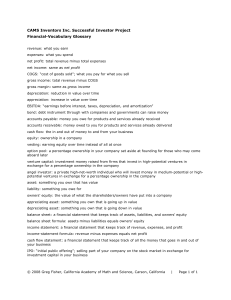Financial Management: Review Questions & Answers
advertisement
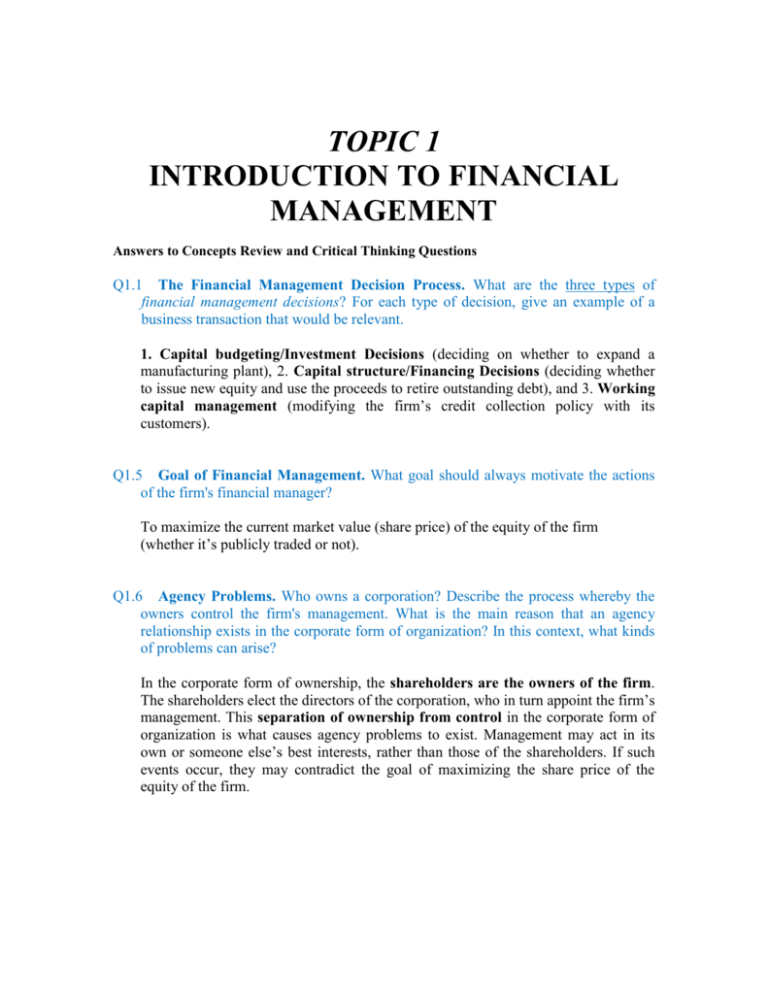
TOPIC 1 INTRODUCTION TO FINANCIAL MANAGEMENT Answers to Concepts Review and Critical Thinking Questions Q1.1 The Financial Management Decision Process. What are the three types of financial management decisions? For each type of decision, give an example of a business transaction that would be relevant. 1. Capital budgeting/Investment Decisions (deciding on whether to expand a manufacturing plant), 2. Capital structure/Financing Decisions (deciding whether to issue new equity and use the proceeds to retire outstanding debt), and 3. Working capital management (modifying the firm’s credit collection policy with its customers). Q1.5 Goal of Financial Management. What goal should always motivate the actions of the firm's financial manager? To maximize the current market value (share price) of the equity of the firm (whether it’s publicly traded or not). Q1.6 Agency Problems. Who owns a corporation? Describe the process whereby the owners control the firm's management. What is the main reason that an agency relationship exists in the corporate form of organization? In this context, what kinds of problems can arise? In the corporate form of ownership, the shareholders are the owners of the firm. The shareholders elect the directors of the corporation, who in turn appoint the firm’s management. This separation of ownership from control in the corporate form of organization is what causes agency problems to exist. Management may act in its own or someone else’s best interests, rather than those of the shareholders. If such events occur, they may contradict the goal of maximizing the share price of the equity of the firm. 2 Q1.7 Primary versus Secondary Markets. You've probably noticed coverage in the financial press of an initial public offering (IPO) of a company's securities. Web search company Google is a relatively recent example. Is an IPO a primary-market transaction or a secondary-market transaction? A primary market transaction. Q1.10 Ethics and Firm Goals. Can our goal of maximizing the value of the stock conflict with other goals, such as avoiding unethical or illegal behavior? In particular, do you think subjects such as customer and employee safety, the environment, and the general good of society fit in this framework, or are they essentially ignored? Try to think of some specific scenarios to illustrate your answer. An argument can be made either way. At one extreme, we could argue that in a market economy, all of these things are priced. This implies an optimal level of ethical and/or illegal behavior and the framework of stock valuation explicitly includes these. At the other extreme, we could argue that these are non-economic phenomena and are best handled through the political process. The following is a classic (and highly relevant) thought question that illustrates this debate: “A firm has estimated that the cost of improving the safety of one of its products is $30 million. However, the firm believes that improving the safety of the product will only save $20 million in product liability claims. What should the firm do?” Q1.11 International Firm Goal. Would our goal of maximizing the value of the stock be different if we were thinking about financial management in a foreign country? Why or why not? The goal will be the same, but the best course of action toward that goal may require adjustments due different social, political, and economic climates. Q1.13 Agency Problems and Corporate Ownership. Corporate ownership varies around the world. Historically, individuals have owned the majority of shares in public corporations in the United States. In Germany and Japan, however, banks, other large financial institutions, and other companies own most of the stock in public corporations. Do you think agency problems are likely to be more or less severe in Germany and Japan than in the United States? Why? In recent years, large financial institutions such as mutual funds and pension funds have been becoming the dominant owners of stock in the United States, and these institutions are becoming more active in corporate affairs. What are the implications of this trend for agency problems and corporate control? We would expect agency problems to be less severe in other countries, primarily due to the relatively small percentage of individual ownership. Fewer individual owners should reduce the number of diverse opinions concerning corporate goals. The high percentage of institutional ownership might lead to a higher degree of agreement between owners and 3 managers on decisions concerning risky projects. In addition, institutions may be able to implement more effective monitoring mechanisms than can individual owners, given an institution’ deeper resources and experiences with their own management. The increase in institutional ownership of stock in the United States and the growing activism of these large shareholder groups may lead to a reduction in agency problems for U.S. corporations and a more efficient market for corporate control.

